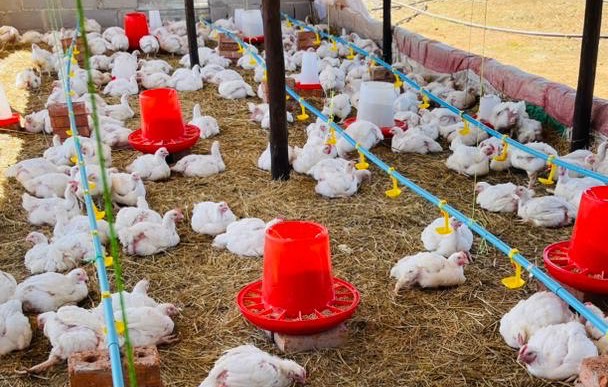BY NDUMISO TSHUMA
In a quest to maximise profit in broiler chicken production, experts in the field have shared valuable tips and insights to help farmers succeed.
Dr Enock Machingauta, a Poultry Health Care specialist and an advisor at Upwise Farming Company, has provided key recommendations to enhance profitability in broiler farming.
Dr Machingauta stated that farmers can streamline operations by carefully managing feed efficiency and ensuring broilers’ growth. He added that efficient broiler production requires careful planning, attention to detail, and a commitment to continuous improvement.
“Efficient broiler production requires careful planning, attention to detail, and a commitment to continuous improvement. When harvesting at optimal weight, a farmer must ensure birds reach market weight to maximize revenue when selling their products. A farmer must also keep accurate records and track feed consumption, mortality, and growth rates to make data-driven decisions. The most crucial is for a farmer to stay up-to-date with market trends. By staying up to date with market trends, a farmer can adjust production strategies to meet changing market demands,” said Machingauta.
Dr Machingauta noted the importance of maintaining good health among broilers. He added that implementing proper vaccination protocols and biosecurity measures is essential to minimize disease risks and safeguard the flock’s well-being.
“There are several strategies that one can use in poultry production farming. Optimizing feed conversion and ensuring efficient feed usage reduce costs and maintain good health. A farmer must also implement proper vaccination and biosecurity programs to minimise disease risks,” said Machingauta.
Furthermore, Dr Machingauta emphasised the significance of optimising stocking density to balance bird comfort with space utilisation, ultimately promoting growth and profitability.
He added that by providing adequate space for broilers while maximizing growth potential, farmers can achieve better results in their production cycles.
“When it comes to optimising stocking density, a farmer must balance bird comfort and space to maximise growth and profitability. A poultry farmer must also monitor and control temperature, ensuring optimal temperatures for bird comfort and growth. Farmers are also advised to manage water quality and ensure clean and accessible water to promote healthy growth,” said Machingauta.
Dr Machingauta stated that temperature control, efficient lighting programs, and humidity monitoring are among the other recommendations to enhance broiler farming practices.
“The implementation of efficient lighting programs must balance light intensity and duration to promote growth and reduce energy costs. A farmer should monitor and control humidity. If a farmer maintains optimal humidity levels, it will prevent diseases and promote growth,” said Machingauta.
Moreover, Dr Machingauta addressed indicators that may suggest chicks are not happy or healthy, such as signs of stress, abnormal behaviour, and dull appearance. He added that taking proactive measures, including improving living conditions and providing necessary care like using Endocox, can help enhance the well-being of the chicks and optimize their growth and development.
“If your chicks are not happy, there are a few behaviours that may indicate this. They may be showing signs of stress, such as puffing out their feathers, huddling together, or pecking at each other. They may also be lethargic and not eating or drinking as much as they should be. Their eyes may be dull and they may have dirty or matted feathers. Their droppings may be loose or abnormal in colour or consistency. You can give them Endocox to stimulate the immune system by increasing white blood cells for good health. If you notice any of these behaviours, it is important to take action to improve your chicks’ living conditions and make them more comfortable,” said Dr Machingauta.
In a separate perspective focusing on turkeys, farmer Immanuel Gatsheni shed light on addressing pecking behaviour in turkeys to ensure their well-being and productivity. Gatsheni outlined various factors that may contribute to pecking issues in turkeys, ranging from stress and poor nutrition to genetic predispositions and social dynamics within the flock.
“Further pecking in turkeys can be caused by a variety of factors: overcrowding and competition for resources, poor nutrition and diet, lack of environmental enrichment and stimulation, and genetic predisposition. Feather pecking and pulling in turkeys can lead to further pecking and cannibalism amongst the turkeys,” said Gatsheni.
To address the causes, Gatsheni emphasized the importance of providing a stimulating environment, ensuring proper nutrition and healthcare, and implementing management strategies to reduce stress and competition among turkeys.
“It’s important to address these underlying causes to prevent and manage further pecking behaviour in turkeys. This can include providing a stimulating environment, ensuring adequate nutrition and healthcare, and implementing management strategies to reduce stress and competition. Health issues involve pain or discomfort in the turkey. When there is inadequate lighting and ventilation, it can lead to beak trimming or beak malformation,” said Gatsheni.


Good advice 🥰
I need to learn how to keep chickens
Thanks for your educative article
Regards
Augustine Chikaya
Chekin